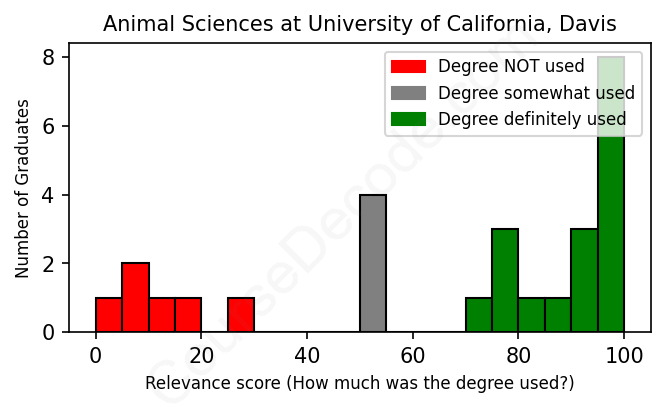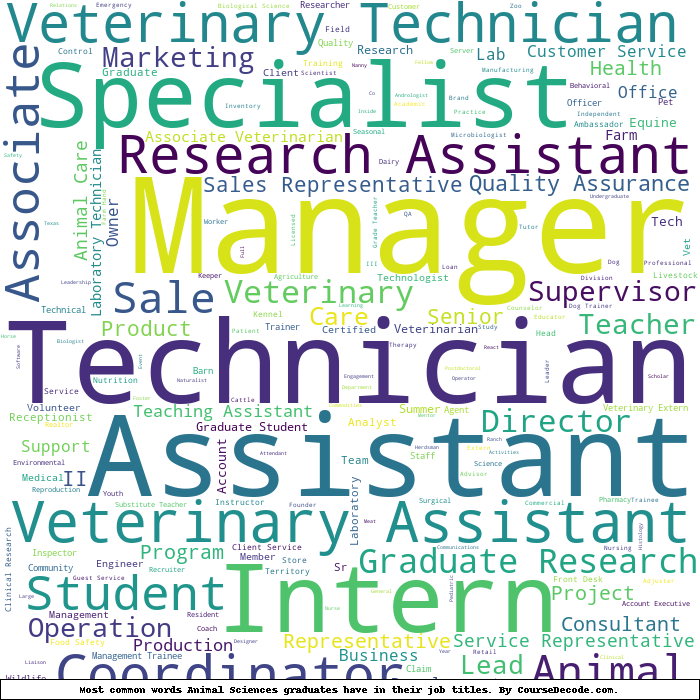
First, some facts. Of the Animal Sciences graduates from University of California, Davis we've analyzed , here's how many have used (or NOT used) their degree in their career:

These are estimates based on AI analysis of 27 LinkedIn profiles (see below).
The verdict? Slightly below average. Overall, with an average relevance score of 66%, Animal Sciences graduates from University of California, Davis have a slightly lower likelihood (-1%) of finding work in this field compared to the average graduate across all fields:
And for comparison, here's the chart for all profiles we've looked at across all degrees.
Also, after graduating, 51% of these graduates have pursued further education other than another Bachelor's degree (such as a Masters degree or other), compared to the average across all profiles of 35%. This suggests you may need more than just a Bachelors degree to be competitive as a Animal Sciences graduate.
See the details:
|
Relevance score: 8% We think this person has NOT gone into a career related to their degree. We think this person has NOT gone into a career related to their degree.
DEGREE INFOGraduated in 2022 from University of California, Davis with a Bachelor of Science - BS in Animal Sciences. No other secondary education since. JOB HISTORY SINCE GRADUATIONReceptionist/Kennel Assistant Yorba Lake Pet Clinic Jun 2023 - Aug 2023 Server  hikari sushi & ramen Jul 2022 - Apr 2024 ABOUTNo information provided. |
The top 10 most common jobs done by the graduates we've analyzed (ranked most common to least) are:
From my analysis of the LinkedIn profiles of University of California, Davis graduates with degrees in Animal Sciences, it seems that many have ended up in jobs that are closely related to animal care, veterinary practices, and research. A significant portion of these individuals work in veterinary hospitals or clinics as veterinary technicians, assistants, or even veterinarians, where they can directly use their knowledge of animal biology, health, and welfare. Other roles, such as diagnostic imaging residents and radiologists, show a strong link to the degree as well, indicating that many have pursued careers in more specialized veterinary medicine. There is also a noted presence of individuals involved in research, whether in laboratories or academic institutions, where they apply the scientific principles learned through their studies.
However, it’s worth mentioning that not every job is relevant to the field of Animal Sciences. Some graduates have taken roles in areas such as hospitality (like innkeepers or chefs) and tech (like software engineers), which don’t require any specific knowledge of animals. There are a few positions that utilize tangential skills—such as understanding animal welfare or health in broader health-related roles—but overall, these seem to be the exception rather than the rule. The majority of jobs listed tend to align well with the training obtained in Animal Sciences, especially those that involve hands-on animal care or veterinary medicine. So, while there’s a mix, it’s clear that many UC Davis grads are using their degrees in ways that are quite relevant to their educational background.
Here is a visual representation of the most common words in job titles for Animal Sciences graduates (this is across all Animal Sciences graduates we've analyzed, not just those who went to University of California, Davis):

Looking at the career trajectories of graduates from the University of California, Davis who studied Animal Sciences, it's pretty clear that many of them are finding their footing in fields closely related to their degree. Right after graduation, a good number of these graduates often start out in hands-on roles, like veterinary technicians or assistants, which makes a lot of sense considering the practical experience they're likely to have gained during their studies. For example, several graduates began their careers working in veterinary hospitals or animal care facilities, which aligns perfectly with their educational background. There is also a significant portion that invests time in internships and residency programs to specialize further in veterinary medicine, focusing on areas like diagnostic imaging or emergency care.
Fast forward five to ten years, and many of these individuals have continued to build on that initial experience, with several achieving roles as veterinarians, specialists, or even educators within veterinary colleges. It's evident that the degree can lead to solid job stability in the veterinary and animal health fields, and there’s also a notable number pursuing careers in research and animal health technology. However, not every grad takes the direct route in animal sciences. Some have ventured into unrelated fields, like food blogging or software engineering, which suggests a broader range of career paths but also highlights that not everyone remains aligned with their original degree. Overall, while many have found fulfilling careers directly tied to Animal Sciences, a few have diverged into other industries, which might indicate varying levels of job satisfaction or flexibility in what graduates choose to pursue post-college.
Getting a Bachelor's degree in Animal Sciences at UC Davis can be pretty challenging, to be honest. It's a rigorous program that covers a lot of ground, from biology and physiology to nutrition and genetics of various animals. You'll be dealing with both classroom lectures and hands-on experiences, which means you need to be ready to dive deep into the science and put in the effort, especially during lab work and exams. While some people might find it a bit easier if they're passionate about animals or have a science background, overall, it’s not considered an easy degree. If you really love what you’re studying and stay organized, you can definitely make it through, but expect to put in some serious work!
Most commonly, in the LinkedIn profiles we've looked at, it takes people 4 years to finish a Bachelor degree in Animal Sciences.
When you look at these UC Davis Animal Sciences graduates, it seems like the money side of things is a mixed bag. The ones who took on more advanced roles, like the radiologist and the assistant professor, are probably pulling in some decent salaries, especially since those jobs in the veterinary field can pay pretty well with experience. On the flip side, others started with entry-level positions—like innkeepers or chefs—so their pay might not be as high. A few have transitioned into tech, which usually offers better earnings, while others are sticking to the vet scene, where pay can vary widely based on the job. Overall, it seems like some are doing pretty well for themselves, particularly those who stuck with veterinary medicine and advanced their careers.
Here is a visual representation of the most common words seen in the "about" section of LinkedIn profiles who have a Bachelor degree in Animal Sciences (this is across all Animal Sciences graduates we've analyzed, not just those who went to University of California, Davis). This may or may not be useful:

Here are all colleges offering a Bachelor degree in Animal Sciences (ordered by the average relevance score of their Animal Sciences graduates, best to worst) where we have analyzed at least 10 of their graduates:
| College | Score | Count |
|---|---|---|
 Purdue University Purdue University
|
80 | 14 |
 California State Polytechnic University-Pomona California State Polytechnic University-Pomona
|
78 | 13 |
 North Carolina State University North Carolina State University
|
77 | 18 |
 Iowa State University Iowa State University
|
75 | 25 |
 University of Missouri-Columbia University of Missouri-Columbia
|
75 | 12 |
 South Dakota State University South Dakota State University
|
73 | 10 |
 The Ohio State University The Ohio State University
|
71 | 21 |
 University of Florida University of Florida
|
68 | 15 |
 University of Vermont University of Vermont
|
68 | 12 |
 Michigan State University Michigan State University
|
67 | 20 |
 University of California, Davis University of California, Davis
|
66 | 27 |
 University of Illinois at Urbana-Champaign University of Illinois at Urbana-Champaign
|
63 | 16 |
 University of Tennessee, Knoxville University of Tennessee, Knoxville
|
61 | 13 |
 University of Arkansas University of Arkansas
|
60 | 10 |
 California Polytechnic State University-San Luis Obispo California Polytechnic State University-San Luis Obispo
|
59 | 22 |
 University of Wisconsin-River Falls University of Wisconsin-River Falls
|
58 | 10 |
 Texas A&M University Texas A&M University
|
54 | 34 |
 Penn State University Penn State University
|
53 | 14 |
 Texas Tech University Texas Tech University
|
51 | 12 |
 Kansas State University Kansas State University
|
51 | 22 |
 Oklahoma State University Oklahoma State University
|
43 | 16 |